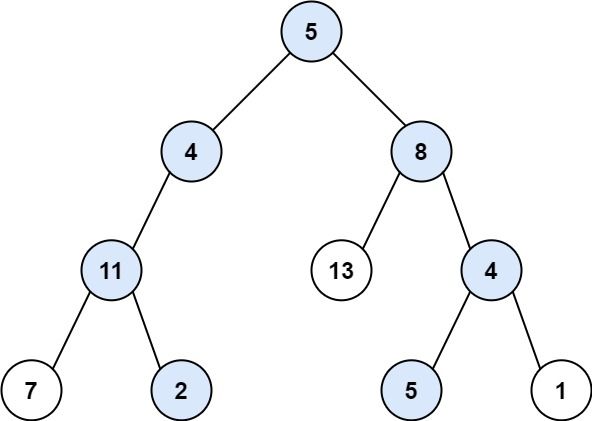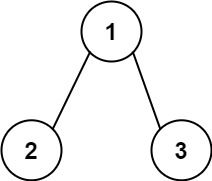comments: true
difficulty: 中等
edit_url: https://github.com/doocs/leetcode/edit/main/lcof/%E9%9D%A2%E8%AF%95%E9%A2%9834.%20%E4%BA%8C%E5%8F%89%E6%A0%91%E4%B8%AD%E5%92%8C%E4%B8%BA%E6%9F%90%E4%B8%80%E5%80%BC%E7%9A%84%E8%B7%AF%E5%BE%84/README.md
面试题 34. 二叉树中和为某一值的路径
题目描述
给你二叉树的根节点 root 和一个整数目标和 targetSum ,找出所有 从根节点到叶子节点 路径总和等于给定目标和的路径。
叶子节点 是指没有子节点的节点。
示例 1:

输入:root = [5,4,8,11,null,13,4,7,2,null,null,5,1], targetSum = 22 输出:[[5,4,11,2],[5,8,4,5]]
示例 2:

输入:root = [1,2,3], targetSum = 5 输出:[]
示例 3:
输入:root = [1,2], targetSum = 0 输出:[]
提示:
- 树中节点总数在范围
[0, 5000]内 -1000 <= Node.val <= 1000-1000 <= targetSum <= 1000
注意:本题与主站 113 题相同:https://leetcode.cn/problems/path-sum-ii/
解法
方法一:递归
从根节点开始,递归遍历每个节点,每次递归时,将当前节点值加入到路径中,然后判断当前节点是否为叶子节点,如果是叶子节点并且路径和等于目标值,则将该路径加入到结果中。如果当前节点不是叶子节点,则递归遍历其左右子节点。递归遍历时,需要将当前节点从路径中移除,以确保返回父节点时路径刚好是从根节点到父节点。
时间复杂度 O ( n 2 ) O(n^2) O(n2),空间复杂度 O ( n ) O(n) O(n)。其中 n n n 是二叉树的节点数。
Python3
# Definition for a binary tree node.
# class TreeNode:
# def __init__(self, val=0, left=None, right=None):
# self.val = val
# self.left = left
# self.right = right
class Solution:
def pathSum(self, root: TreeNode, target: int) -> List[List[int]]:
def dfs(root, s):
if root is None:
return
#加入节点的同时,检查路径是否满足
t.append(root.val)
s -= root.val
if root.left is None and root.right is None and s == 0:#root不能为空
ans.append(t[:]) #t会动态改变
dfs(root.left, s)
dfs(root.right, s)
t.pop() #这种写法,回溯时不需要s+=root.val
ans = []
t = []
dfs(root, target)
return ans
# Definition for a binary tree node.
# class TreeNode(object):
# def __init__(self, x):
# self.val = x
# self.left = None
# self.right = None
class Solution(object):
def findPath(self, root, sum):
"""
:type root: TreeNode
:type sum: int
:rtype: List[List[int]]
"""
def dfs(root):
nonlocal s
if root is None:
return
t.append(root.val)
s-=root.val
if root.left is None and root.right is None and s==0:
ans.append(t[:])
dfs(root.left)
dfs(root.right)
t.pop()
s+=root.val
ans = []
t=[]
s=sum
dfs(root)
return ans
Java
/**
* Definition for a binary tree node.
* public class TreeNode {
* int val;
* TreeNode left;
* TreeNode right;
* TreeNode() {}
* TreeNode(int val) { this.val = val; }
* TreeNode(int val, TreeNode left, TreeNode right) {
* this.val = val;
* this.left = left;
* this.right = right;
* }
* }
*/
class Solution {
private List<Integer> t = new ArrayList<>();
private List<List<Integer>> ans = new ArrayList<>();
public List<List<Integer>> pathSum(TreeNode root, int target) {
dfs(root, target);
return ans;
}
private void dfs(TreeNode root, int s) {
if (root == null) {
return;
}
t.add(root.val);
s -= root.val;
if (root.left == null && root.right == null && s == 0) {
ans.add(new ArrayList<>(t));
}
dfs(root.left, s);
dfs(root.right, s);
t.remove(t.size() - 1);
}
}
C++
/**
* Definition for a binary tree node.
* struct TreeNode {
* int val;
* TreeNode *left;
* TreeNode *right;
* TreeNode() : val(0), left(nullptr), right(nullptr) {}
* TreeNode(int x) : val(x), left(nullptr), right(nullptr) {}
* TreeNode(int x, TreeNode *left, TreeNode *right) : val(x), left(left), right(right) {}
* };
*/
class Solution {
public:
vector<vector<int>> pathSum(TreeNode* root, int target) {
vector<vector<int>> ans;
vector<int> t;
function<void(TreeNode * root, int s)> dfs = [&](TreeNode* root, int s) {
if (!root) {
return;
}
t.push_back(root->val);
s -= root->val;
if (!root->left && !root->right && !s) {
ans.push_back(t);
}
dfs(root->left, s);
dfs(root->right, s);
t.pop_back();
};
dfs(root, target);
return ans;
}
};
Go
/**
* Definition for a binary tree node.
* type TreeNode struct {
* Val int
* Left *TreeNode
* Right *TreeNode
* }
*/
func pathSum(root *TreeNode, target int) (ans [][]int) {
t := []int{}
var dfs func(*TreeNode, int)
dfs = func(root *TreeNode, s int) {
if root == nil {
return
}
t = append(t, root.Val)
s -= root.Val
if root.Left == nil && root.Right == nil && s == 0 {
ans = append(ans, slices.Clone(t))
}
dfs(root.Left, s)
dfs(root.Right, s)
t = t[:len(t)-1]
}
dfs(root, target)
return
}
TypeScript
/**
* Definition for a binary tree node.
* class TreeNode {
* val: number
* left: TreeNode | null
* right: TreeNode | null
* constructor(val?: number, left?: TreeNode | null, right?: TreeNode | null) {
* this.val = (val===undefined ? 0 : val)
* this.left = (left===undefined ? null : left)
* this.right = (right===undefined ? null : right)
* }
* }
*/
function pathSum(root: TreeNode | null, target: number): number[][] {
const ans: number[][] = [];
const t: number[] = [];
const dfs = (root: TreeNode | null, s: number): void => {
if (!root) {
return;
}
const { val, left, right } = root;
t.push(val);
s -= val;
if (!left && !right && s === 0) {
ans.push([...t]);
}
dfs(left, s);
dfs(right, s);
t.pop();
};
dfs(root, target);
return ans;
}
Rust
// Definition for a binary tree node.
// #[derive(Debug, PartialEq, Eq)]
// pub struct TreeNode {
// pub val: i32,
// pub left: Option<Rc<RefCell<TreeNode>>>,
// pub right: Option<Rc<RefCell<TreeNode>>>,
// }
//
// impl TreeNode {
// #[inline]
// pub fn new(val: i32) -> Self {
// TreeNode {
// val,
// left: None,
// right: None
// }
// }
// }
use std::cell::RefCell;
use std::rc::Rc;
impl Solution {
fn dfs(
root: &Option<Rc<RefCell<TreeNode>>>,
mut target: i32,
t: &mut Vec<i32>,
ans: &mut Vec<Vec<i32>>,
) {
if let Some(node) = root.as_ref() {
let node = node.borrow();
t.push(node.val);
target -= node.val;
if node.left.is_none() && node.right.is_none() && target == 0 {
ans.push(t.clone());
}
Self::dfs(&node.left, target, t, ans);
Self::dfs(&node.right, target, t, ans);
t.pop();
}
}
pub fn path_sum(root: Option<Rc<RefCell<TreeNode>>>, target: i32) -> Vec<Vec<i32>> {
let mut ans = vec![];
Self::dfs(&root, target, &mut vec![], &mut ans);
ans
}
}
JavaScript
/**
* Definition for a binary tree node.
* function TreeNode(val, left, right) {
* this.val = (val===undefined ? 0 : val)
* this.left = (left===undefined ? null : left)
* this.right = (right===undefined ? null : right)
* }
*/
/**
* @param {TreeNode} root
* @param {number} target
* @return {number[][]}
*/
var pathSum = function (root, target) {
const ans = [];
const t = [];
const dfs = (root, s) => {
if (!root) {
return;
}
const { val, left, right } = root;
t.push(val);
s -= val;
if (!left && !right && !s) {
ans.push([...t]);
}
dfs(left, s);
dfs(right, s);
t.pop();
};
dfs(root, target);
return ans;
};
C#
/**
* Definition for a binary tree node.
* public class TreeNode {
* public int val;
* public TreeNode left;
* public TreeNode right;
* public TreeNode(int val=0, TreeNode left=null, TreeNode right=null) {
* this.val = val;
* this.left = left;
* this.right = right;
* }
* }
*/
public class Solution {
private List<IList<int>> ans = new List<IList<int>>();
private List<int> t = new List<int>();
public IList<IList<int>> PathSum(TreeNode root, int target) {
dfs(root, target);
return ans;
}
private void dfs(TreeNode root, int s) {
if (root == null) {
return;
}
t.Add(root.val);
s -= root.val;
if (root.left == null && root.right == null && s == 0) {
ans.Add(new List<int>(t));
}
dfs(root.left, s);
dfs(root.right, s);
t.RemoveAt(t.Count - 1);
}
}
Swift
/**
* Definition for a binary tree node.
* public class TreeNode {
* public var val: Int
* public var left: TreeNode?
* public var right: TreeNode?
* public init() { self.val = 0; self.left = nil; self.right = nil; }
* public init(_ val: Int) { self.val = val; self.left = nil; self.right = nil; }
* public init(_ val: Int, _ left: TreeNode?, _ right: TreeNode?) {
* self.val = val
* self.left = left
* self.right = right
* }
* }
*/
class Solution {
private var t = [Int]()
private var ans = [[Int]]()
func pathSum(_ root: TreeNode?, _ target: Int) -> [[Int]] {
dfs(root, target)
return ans
}
private func dfs(_ root: TreeNode?, _ s: Int) {
guard let root = root else {
return
}
t.append(root.val)
let remainingSum = s - root.val
if root.left == nil && root.right == nil && remainingSum == 0 {
ans.append(Array(t))
}
dfs(root.left, remainingSum)
dfs(root.right, remainingSum)
t.removeLast()
}
}





















 127
127

 被折叠的 条评论
为什么被折叠?
被折叠的 条评论
为什么被折叠?








